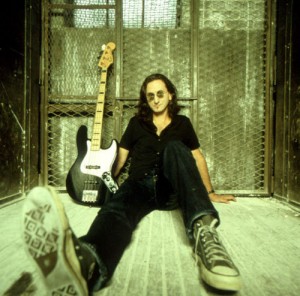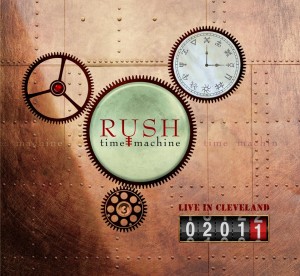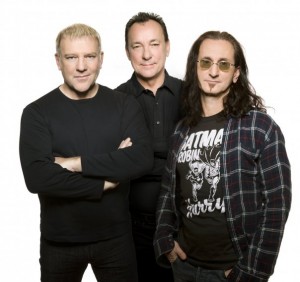Riffs, Rants & Rumors: Geddy Lee Revs Up Rush's 'Time Machine'
posted in: Features • Rock
 It was thirty years ago that Moving Pictures bumped Rush up from successful journeymen with a respectable following to full-fledged rock stars. While its predecessor (Permanent Waves) was the Canadian power trio’s first commercial breakthrough in the US, Moving Pictures was the album that found Rush moving from the prog-rock extravaganzas of the past to a more concise approach, and reaching out in new directions” incorporating everything from New Wave to reggae in their stylistic mix. Since then, the alienation anthem Limelight and the video-game synthesizer riffs and octopus-on-speed drum fills of Tom Sawyer have soundtracked the teen travails of a few different generations, with countless air guitars raised aloft in tribute to the staying power of this crowning moment in Rush’s career.
It was thirty years ago that Moving Pictures bumped Rush up from successful journeymen with a respectable following to full-fledged rock stars. While its predecessor (Permanent Waves) was the Canadian power trio’s first commercial breakthrough in the US, Moving Pictures was the album that found Rush moving from the prog-rock extravaganzas of the past to a more concise approach, and reaching out in new directions” incorporating everything from New Wave to reggae in their stylistic mix. Since then, the alienation anthem Limelight and the video-game synthesizer riffs and octopus-on-speed drum fills of Tom Sawyer have soundtracked the teen travails of a few different generations, with countless air guitars raised aloft in tribute to the staying power of this crowning moment in Rush’s career.
 Earlier this year, Geddy Lee, Neil Peart and Alex Lifeson decided to throw Moving Pictures a moving birthday party, taking the album in its entirety to stages all over the world, and Time Machine 2011: Live in Cleveland documents the occasion on both CD and DVD. Examining the motivations behind this kind of full-album tour, singer/bass player Lee says, I think it’s born out of two things: you’ve got an older fanbase that love those particular albums, and love the idea of hearing them in their entirety, and there is a younger fanbase¦they’ve been handed down those songs without ever having the experience of seeing them played live. So when a band like ourselves plays something like that in its entirety it draws from both those areas.
Earlier this year, Geddy Lee, Neil Peart and Alex Lifeson decided to throw Moving Pictures a moving birthday party, taking the album in its entirety to stages all over the world, and Time Machine 2011: Live in Cleveland documents the occasion on both CD and DVD. Examining the motivations behind this kind of full-album tour, singer/bass player Lee says, I think it’s born out of two things: you’ve got an older fanbase that love those particular albums, and love the idea of hearing them in their entirety, and there is a younger fanbase¦they’ve been handed down those songs without ever having the experience of seeing them played live. So when a band like ourselves plays something like that in its entirety it draws from both those areas.
Rush is certainly no stranger to live albums, either. In fact, Time Machine is the ninth live release of their thirty-seven-year recording career. Lee feels the band’s approach is well suited to the format. The Rush sound was honed and crafted and worked on as a live touring band, he says. Everything that we are we owe to the number of shows we used to do. Touring so much really developed us as musicians and developed our sense of what a show should be, and our sense of what good value is to our fans. So much of what we are came out of years and years of touring, so it does always feel appropriate to record wherever we happen to be as a live band at that moment.
Besides ZZ Top, it’s tough to think of another major rock band that’s kept its membership intact over such a long period of time. Musing on the longevity of his working relationship with Lifeson and Peart, Lee says, There’s a few parts that make the chemistry of that. One, we enjoy each other as musicians tremendously. I think we have great respect for each other as players. Two, we really know how to make each other laugh, and I think that is really important. It’s also a bit of a competitive thing between the three of us, where we’re always trying to make each other laugh. There’s a kind of game that’s involved in our relationship”who can be funnier. And over the years, regardless of what’s happened, we have remained friends, and I think that’s really important.
 One of the places that sense of humor comes out is in the short, satirical films Rush puts together to show at their concerts. The one that’s included on the Time Machine DVD is a perfect example: it follows the fictional evolution of the band from their initial incarnation as a polka band called Rash, and features Lee, Lifeson, and Peart in broadly comedic supporting roles. Lee reckons there’s something uniquely Canadian about the band’s sense of humor. Canadians do have a kind of dry sense of humor, he says, and if you look at our comic tradition, which goes way back to people like [1940s/˜50s comedy team] Wayne & Shuster, who most Americans have never heard of, I’m sure¦through SCTV, which really influenced us tremendously, Second City was sort of a watermark for comedy being made up here in Canada. It had a nice absurdist vibe to it, and I certainly think our sense of humor was influenced by that.
One of the places that sense of humor comes out is in the short, satirical films Rush puts together to show at their concerts. The one that’s included on the Time Machine DVD is a perfect example: it follows the fictional evolution of the band from their initial incarnation as a polka band called Rash, and features Lee, Lifeson, and Peart in broadly comedic supporting roles. Lee reckons there’s something uniquely Canadian about the band’s sense of humor. Canadians do have a kind of dry sense of humor, he says, and if you look at our comic tradition, which goes way back to people like [1940s/˜50s comedy team] Wayne & Shuster, who most Americans have never heard of, I’m sure¦through SCTV, which really influenced us tremendously, Second City was sort of a watermark for comedy being made up here in Canada. It had a nice absurdist vibe to it, and I certainly think our sense of humor was influenced by that.
Besides belly-laughs, Lee looks to baseball to help him ease the tensions of the road and the intense pace of the rock & roll life. A longtime baseball fanatic, he’s involved in a fantasy baseball league that he approaches with an almost religious fervor. I’m a diehard, (fantasy baseball) keeps me alive on the road, he admits. He’s also the owner of a mind-boggling amount of memorabilia. I’m a collector, I’m a pack rat, he confesses. Naming some of his most prized possessions, he says, I have a beautiful ’27 Yankees ball which I value quite highly. If I had to pick one other, it’d be a ball from 1917 signed by Christy Matthewson, in beautiful shape. I tend to like the single, signed baseballs more than anything, they’re really fun to chase.
 Despite these diversions, between Rush’s touring and recording schedules it seems they’re something of a workaholic outfit. Fresh off the Time Machine tour, they began work on their next studio album, Clockwork Angels, which is slated for a 2012 release. We’re right in the midst of it now, Lee reveals. We have about six more songs written at this point. So it’s taking shape right before our eyes. And I’m really pleased with it, there seems to be a high level of melodic content, a real musician’s kind of vibe, there’s some real ˜playing’ music. I think our goal, as always, is to have an album that has quite a lot of variety.
Despite these diversions, between Rush’s touring and recording schedules it seems they’re something of a workaholic outfit. Fresh off the Time Machine tour, they began work on their next studio album, Clockwork Angels, which is slated for a 2012 release. We’re right in the midst of it now, Lee reveals. We have about six more songs written at this point. So it’s taking shape right before our eyes. And I’m really pleased with it, there seems to be a high level of melodic content, a real musician’s kind of vibe, there’s some real ˜playing’ music. I think our goal, as always, is to have an album that has quite a lot of variety.
But as the trio pushes ahead, one of the most unusual things about their career remains the fact that, despite their massive success, they somehow still seem to have a reputation as some kind of cult band. I think it’s true, says Lee, because outside of Canada, where we are considered fairly mainstream, in the rest of the world we’ve sort of avoided the mainstream somehow. I think for our fans it’s great, because they feel they’ve always got something to champion, but I think the fact that we haven’t had huge success on Top 40 radio kind of explains it. It’s Top 40 radio that really exposes you to the wider mainstream world. Even though we have a huge fanbase built on our playing reputation and the quality of our shows, and the fact that progressive radio does play us quite a bit, it’s still not that Top 40 mainstream crowd. Over forty years, we’ve sort of gathered a lot of people along our travels.
